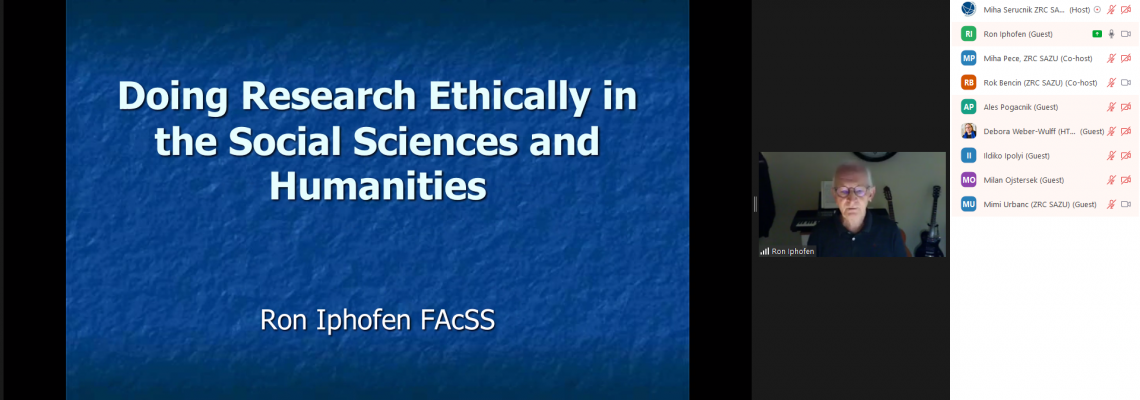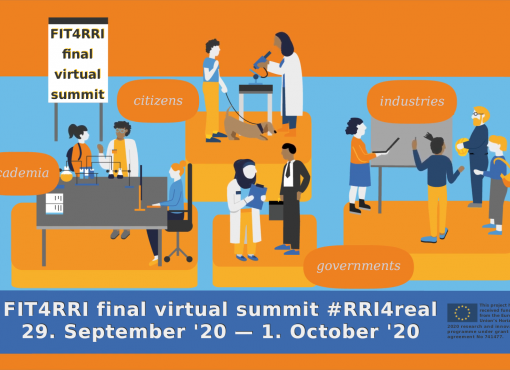
GRACE outreach event in Slovenia: Science – Between Research Ethics and Plagiarism
Organised by Research Centre of the Slovenian Academy of Sciences and Arts (ZRC SAZU)
Research Ethics and Scientific Integrity
The morning session of the event was called Research Ethics and Scientific Integrity and featured three talks. First, Dr. Ildiko Ipolyi from the European Science Foundation presented the GRACE project.
Two speeches by invited speakers followed, one focusing on research ethics in social sciences and the humanities and one on plagiarism. Dr. Ron Iphofen, an independent consultant, internationally recognised for expertise in research ethics and author and editor of many volumes of the topic, presented the fundamental issues and principles of research ethics and the ethics appraisal process. Leaning primarily on examples from social sciences and the humanities, he went on to discuss a set of crucial dilemmas regarding sensitive issues, vulnerable groups and the functions of ethics committees. Prof. Dr. Debora Weber-Wulff, a professor of Media and Computing at the University of Applied Sciences HTW Berlin and renowned plagiarism researcher, discussed the definitions and different kinds of plagiarism, before focusing on the main topic of her talk, namely the limitations and the proper use of plagiarism-detection software. A lively discussion followed, based on questions from the audience. Questions of auto-plagiarism, research with migrants, and the future of RRI research in Horizon Europe, among others, prompted stimulating responses from the three speakers.
Workshop on plagiarism (in Slovenian)
The afternoon workshop on plagiarism was carried out by Prof. Dr. Milan Ojsteršek, a head of the Laboratory for Heterogeneous Computer Systems at University of Maribor and active in the fields of natural language processing, knowledge systems and plagiarism. He gave us a comprehensive overview of language plagiarism detection software and underlying technologies, which was at the end also illustrated with empirical examples on plagiarism detection application/service Detektor podobnih vsebin. Follow-up questions were mainly concerned about the limitations and potential of machine detecting technologies, heavily relating to morning session presentation of prof. Debora Weber-Wulff. Dr. Mimi Urbanc, a deputy director and responsible for GRACE project at ZRC SAZU, gave concluding thoughts.
The event was very well visited, as there were 52 attendees at the morning session and 44 at the afternoon workshop from different universities (University of Ljubljana, University of Maribor, University of Nova Gorica, University of Primorska) as well as vocational colleges (Abitura, College of Nursing, DOBA Faculty, Police College, School Centre Nova Gorica), research institutes (Institute Andrej Marušič, National Institute of Biology, Peace Institute, Regional Study Centre, Slovenian Forestry Institute) and National and University Library.
Here you can find the more detailed programme of the event: https://www.zrc-sazu.si/en/dogodki/science-between-research-ethics-and-plagiarism
You can download the presentations here:
Doing Research Ethically in the Social Sciences and Humanities, Ron Iphofen
Plagiarism: Definition and Detection, Debora Weber-Wulff
https://www.zrc-sazu.si/en/programi-in-projekti/grace
And watch the recording of the event on ZRC SAZU’s Youtube channel:

